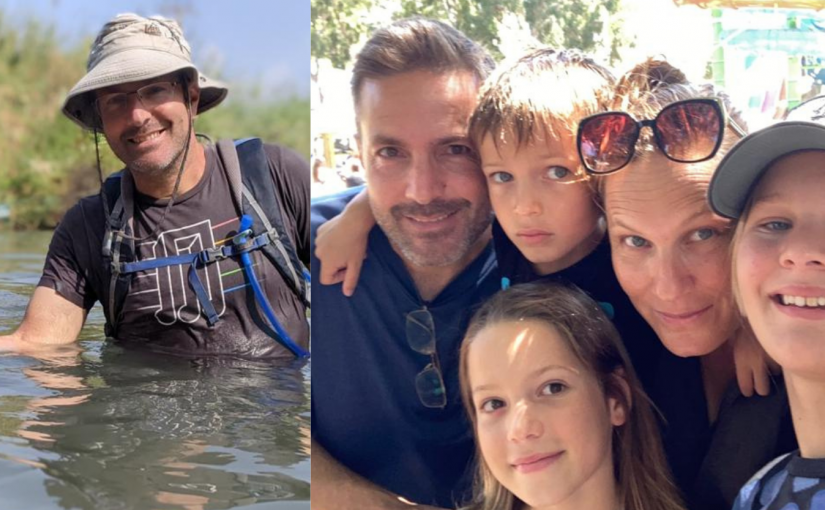This year on Yom Ha’aztmaut, Israel is celebrating 74 years of independence! In honor of the day we reached out to six Young Judaeans who have returned from Young Judaea Gesher, or are about to head to Israel for Young Judaea Year Course, to talk Israel and Yom Ha’aztmaut!
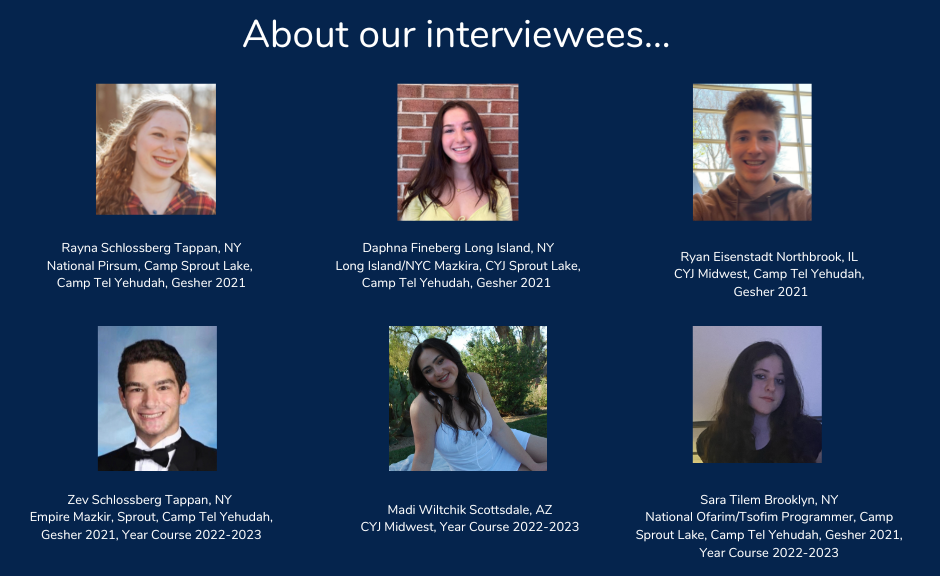
Have you been to Israel before? How would you describe your connection to Israel?
RAYNA: Gesher was my first trip to Israel, but it was not my first connection to Israel. I have spent almost a decade strengthening my connection with Israel without once stepping foot on the ground and I think that prior connection is just as important as my first visit this past summer.
DAPHNA: I had been to Israel several times to visit family. My connection to Israel was mostly based on the family and cultural traditions that I had formed through those experiences.
RYAN: I have been to Israel before Gesher. I think my connection to Israel is strong because I’m passionate about being Jewish and am glad to be able to have Israel as a home if I would want.
SARA: I have been to Israel twice before, once with my middle school and once with Young Judaea. I think my connection to Israel has definitely strengthened over the years. Before I ever went to Israel, and even the first time I went, I felt very disconnected to it. In Israel this summer with Young Judaea, I felt that I really got to know the country and got to understand my role in the country.
MADI: I am very fortunate to have had my Bat Mitzvah in Israel in 2016, and I visited previously in 2013. I feel a very strong connection to Israel, and I am so excited to spend my next year there.
ZEV: I went to Israel this past summer and it was so amazing. After that trip, my connection grew stronger and it feels like a place I can call home.
Was there a particular experience on your Gesher trip that was particularly transformative in shaping your feelings about Israel? What was it, please describe in detail.
RAYNA: During our trip we had several guest speakers talk to us about different Israeli policies. These speakers ranged from topics on the Israeli-Palestinian conflict to Ethiopian refugees, but they all had one thing in common that opened my eyes to the people of Israel. While you could see the love for the country in the eyes, they made sure to have us understand that just because you love the country, does not mean you have to love everything the country does. This showed me that while I may not agree with every law or policy in Israel, that does not diminish the love that I have for the country.
DAPHNA: The conversation with a Jew, a Christian, and a Palestinian Arab was particularly transformative because after hearing stories and perspectives of the three individuals, I was able to form a more complete view of the dynamic between the different cultures. We heard about the difficulties of obtaining residency and citizenship for non Jewish individuals, and were able to discuss how the Israeli laws were meant to protect a Jewish state, but still presented enormous difficulties for those who were not Jewish, even if they lived within the region or within a Palestinian territory. Also, I was able to discuss the religious aspects of the issue with the Christian, particularly in response to the Palestinian Arab telling us that he did not believe Israel’s lack of right to exist was based on religious beliefs. In this conversation, the extent to which Hamas and Fatah were at odds was brought up, which was an aspect of the issue that I was aware of but not knowledgeable about.
RYAN: I was able to see in more depth how much Israel needs to protect itself from hurt. The Israeli culture built on hope and gratitude was cool to see because it is different than in America.
Were there any preconceived notions you had about Israel that were changed after your trip?
RAYNA: I never could fully understand the sense of community that Israeli culture values until I visited. The first place we stayed was Kibbutz Keturah and it was there that I got my first taste as to how strong and welcoming the Israeli community is.
DAPHNA: I had no preconceived notions that were changed. However, I was surprised by the extent of the cultural overlap that occurred, especially in the cities.
RYAN: No, I began to see Israel as an even stronger state after leaving.
What is your favorite thing/things about Israel? (this could be anything – place, food, people, culture)
RAYNA: My favorite thing about Israel is the people. Experiencing the way they all interact with one another is incredible. You can feel the community that has been built and makes everyone feel welcome, whether you understand the language or not.
DAPHNA: My favorite thing about Israel was the food. Ice cafe was delicious and I spent way too much money on an ice cafe at every stop. Also, shuk food was delicious and getting to experience the variety of different cultures through the foods at a shuk was filling and fun.
RYAN: I really liked the art and the food. The Art in Tel-Aviv was really interesting and the food everywhere was phenomenal.
SARA: I love the culture in Israel, it is very unique in my eyes. The food, markets, and Judaism draws me closer and amazes me.
MADI: There are so many things I love about Israel, but I especially love how welcoming and hospitable everyone is. Everyone treats each other like family and it is so comforting to be surrounded by warm, caring people.
ZEV: My favorite thing about Israel is the culture. It is very different than what we have here in America and it is so much fun. I also love the food and people in Israel.
Do you have plans to go back to Israel?
RAYNA: I would love to go back to Israel! My brother is going on Year Course next year and I would love to find a way for me to visit him.
DAPHNA: Currently, I do not have plans. However, I have thought about doing Year Course because I would like to experience more of Israel in a cultural sense. My family and I will also be traveling back at some point to visit relatives.
RYAN: I don’t have current plans, but I will end up back in Israel at some point.
What is the importance of celebrating Israel Independence Day in 2022? How is it different from/similar to celebrating July 4th?
RAYNA: Celebrating Yom Ha’atzmaut is more important in 2022 because we need to be reminded how precious and glorious it is that we have a country for the Jewish people. The way that American and Israeli Independence Day is viewed and celebrated are extremely different. The Fourth of July has barbeques and fireworks, but doesn’t really focus on the history of the country, while Yom Ha’atzmaut embraces and honors the history of the country.
DAPHNA: The importance of celebrating Israel Independence Day is to celebrate the fact that we have survived as a nation and as Jews. We are also celebrating the success of Israel’s autonomy as well as its accomplishments culturally, politically, and technologically.
RYAN: Israel’s freedom was fought for, not given, just like America’s. It’s important to recognize Israel Independence Day in 2022 to keep the vivid culture alive.
SARA: The importance of celebrating Israel Independence Day is to show that we did it, all of the hardships we have been through as Jews will not stop us. In addition to this, it is to celebrate unity of Jews around the world coming together to celebrate their own country. This holiday is the same as July 4th is to us Americans, it is to show that we made this country.
MADI: It is so important to celebrate Israel’s Independence because it is still a fairly new country, yet it has provided so much for Jews around the world. Having a homeland is such a special aspect of the Jewish religion, and the country itself is what many Jews feel a connection to.
ZEV: The importance of celebrating Israel Independence Day in 2022 is to show how the conflict won’t break anyone’s connection to our holy land. It is similar to the Fourth of July because we celebrate our day of independence.
How might we meaningfully mark Israel’s Independence Day in North America?
RAYNA: We meaningfully celebrate Yom Ha’atzmaut in America by celebrating it within our own Jewish communities. I’m sure it will look very different than how it does in Israel, but that does not mean it has to be any less memorable.
DAPHNA: We can mark Israel’s Independence Day by having meals that include Israeli food. We can also congregate with other Israelis to remember the community that Israel has formed and has continued to promote within the Jewish people.
RYAN: Cook Israeli food, play Israeli games, sing Israeli songs, and hang out with family while bonding over a shared love for Israel.
SARA: Meaningfully celebrating Israel Independence Day in America means joining together with your fellow American Jews and celebrating in whatever way you see fit.
MADI: One way to meaningfully celebrate Israel’s Independence Day in North America is to embrace Israeli culture through eating Israeli food and listening to Israeli music.
ZEV: We could meaningfully mark Israel’s Independence Day by having celebrations and having parades all throughout the country.
For our pre-Year Course interviewees…
What made you decide to take a gap year in Israel and what are you most looking forward to?
MADI: While attending Camp Young Judaea Midwest, many of my counselors attended Year Course, and they told us how life changing that year was for them. This past summer as a counselor at CYJ Midwest, I decided that I want to take a gap year after talking more with Year Course alumni.
SARA: I have wanted to go on Year Course since I was a young kid at camp getting put to bed with my counselors’ stories of their Israel experiences. I always felt like it was almost my duty to go on this 9-month adventure. I am most looking forward to getting to know the land and learning about the conflicts of the land.
ZEV: I decided to take a gap year because I wanted the experience of exploring and finding who I am and what I want to achieve before I get to college. I am looking forward to creating new friendships and connections during the trip.
What are you hoping to gain from this experience?
MADI: I am hoping to gain a deeper understanding of Israeli culture and embrace how special the country is. I am also excited to live in a different country to learn about myself and become more independent.
SARA: I am hoping to gain an understanding of the conflict happening in Israel. I feel like whenever I hear about the conflict it is very one-sided and I want to understand the side that I do not hear a loud voice from.
ZEV: I’m hoping to gain life experience and new skills to help me in my chosen career.
 The Gulf War started for us when the first scud missiles were launched towards Israel in January 1991. When we boarded the plane in September 1990, the last thing we were thinking about was being in sealed rooms with gas masks on. We were veteran chanichim of Sprout Lake, CJ North Carolina, CYJ West, CYJ Midwest and CYJ Texas. We had been in MH together at Tel Yehudah. We were on regional and national Mazkirut. Some of us had known each other through camp since we were 10-years old. In short, we were very excited about spending the best year of our lives together in Israel on Year Course.
The Gulf War started for us when the first scud missiles were launched towards Israel in January 1991. When we boarded the plane in September 1990, the last thing we were thinking about was being in sealed rooms with gas masks on. We were veteran chanichim of Sprout Lake, CJ North Carolina, CYJ West, CYJ Midwest and CYJ Texas. We had been in MH together at Tel Yehudah. We were on regional and national Mazkirut. Some of us had known each other through camp since we were 10-years old. In short, we were very excited about spending the best year of our lives together in Israel on Year Course.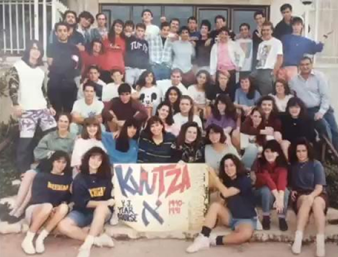 Both of these events, while different in scope, shaped the lives of the participants of Year Course 1990-1991 in significant ways, creating lifelong bonds that last to this day.
Both of these events, while different in scope, shaped the lives of the participants of Year Course 1990-1991 in significant ways, creating lifelong bonds that last to this day. remembered begging our parents to let us stay in Israel. We remembered when some were forced to leave. We remembered the first siren and running to the sealed room. We remembered playing lots of basketball. We called our team the Arad Masketeers, named after the gas masks we had to wear each time there was an attack. Who could have imagined that 30 years later, when we saw each other in person, we would be forced to wear masks again?
remembered begging our parents to let us stay in Israel. We remembered when some were forced to leave. We remembered the first siren and running to the sealed room. We remembered playing lots of basketball. We called our team the Arad Masketeers, named after the gas masks we had to wear each time there was an attack. Who could have imagined that 30 years later, when we saw each other in person, we would be forced to wear masks again?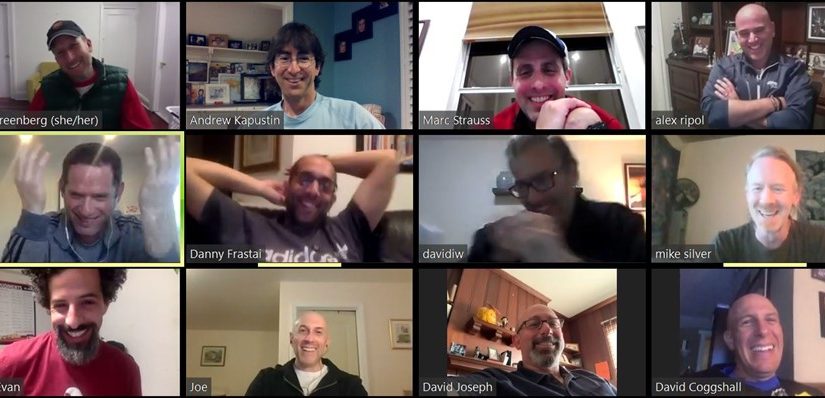
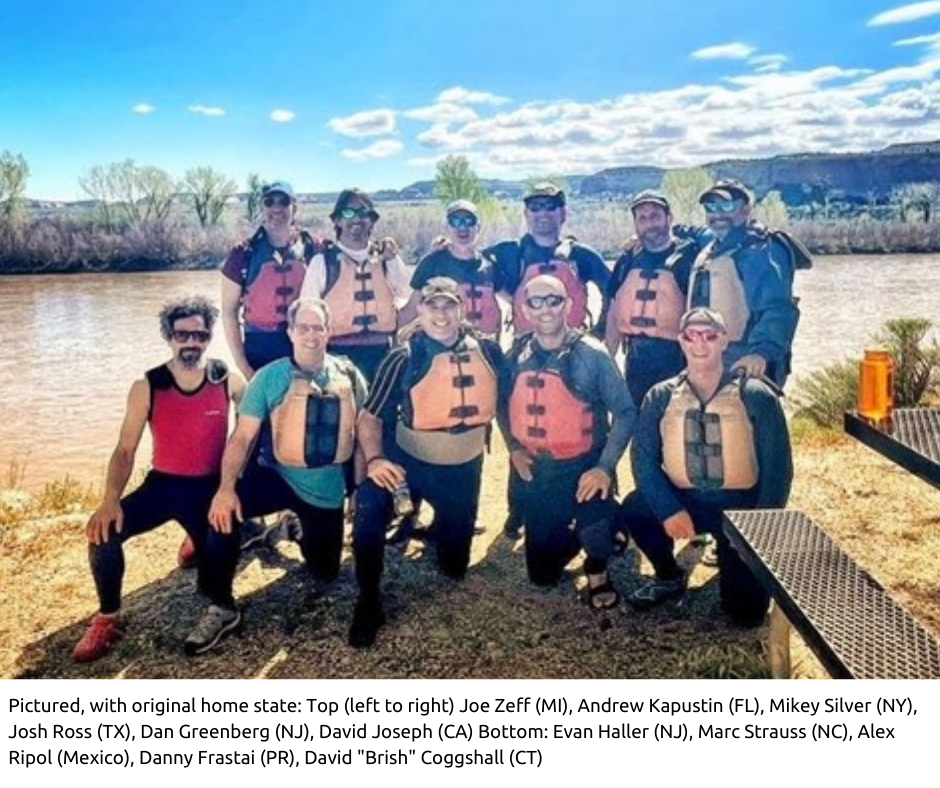
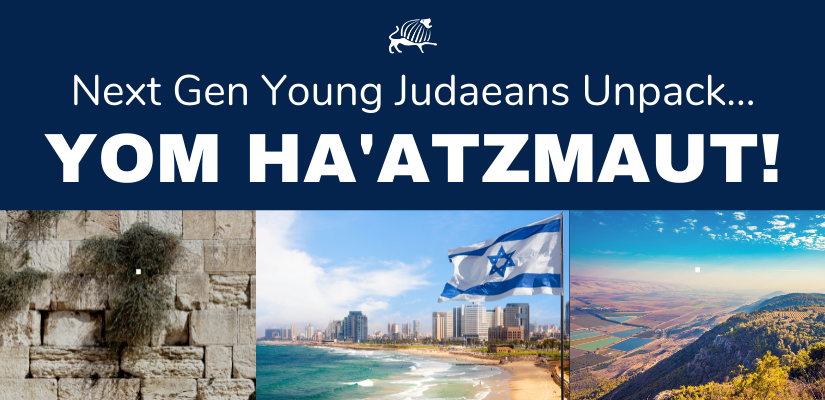

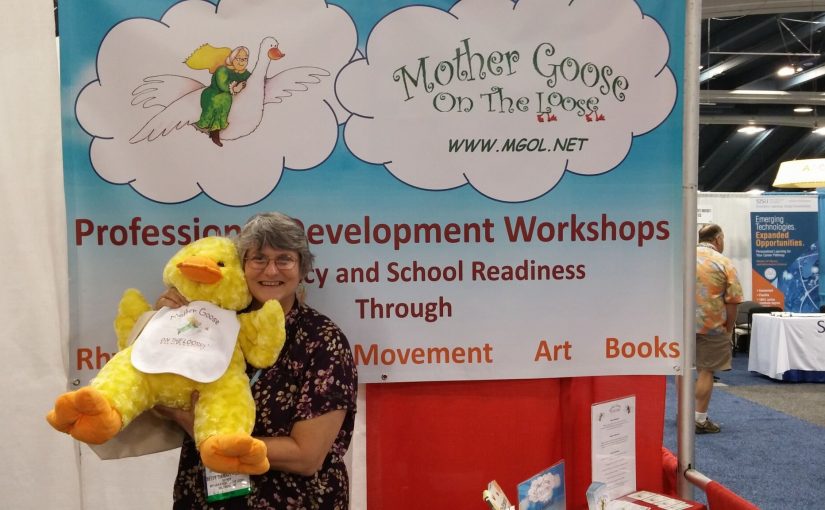
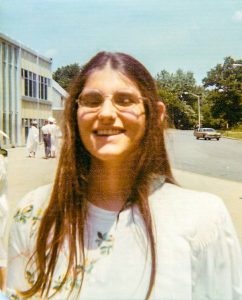 In Jr. High School, each organization gave a little pitch for membership, and I chose to join Young Judaea. After two years in Tsofim, I joined Bogrim. My good friend Joe Pomper told me that the nearby town of Westport, Connecticut was going to be starting a YJ club for Tsofim and were looking for a madricha and asked if I would take the job. Without stopping to think about the fact that I was only one year older than the kids I would be leading, I agreed. For two years, I met regularly with our Senior Advisor, Judy Targan, to plan out the programs. Since I couldn’t yet drive, I’d take the Sunday morning train to Westport and a woman from Hadassah would transport me to whichever child’s home was hosting the meeting that day. Through leading the club, I learned techniques for getting people’s attention such as pausing and speaking more softly rather than trying to shout loudly, and clapping to a rhyme and starting a song which brought people together and directed their attention without needing to say a word.
In Jr. High School, each organization gave a little pitch for membership, and I chose to join Young Judaea. After two years in Tsofim, I joined Bogrim. My good friend Joe Pomper told me that the nearby town of Westport, Connecticut was going to be starting a YJ club for Tsofim and were looking for a madricha and asked if I would take the job. Without stopping to think about the fact that I was only one year older than the kids I would be leading, I agreed. For two years, I met regularly with our Senior Advisor, Judy Targan, to plan out the programs. Since I couldn’t yet drive, I’d take the Sunday morning train to Westport and a woman from Hadassah would transport me to whichever child’s home was hosting the meeting that day. Through leading the club, I learned techniques for getting people’s attention such as pausing and speaking more softly rather than trying to shout loudly, and clapping to a rhyme and starting a song which brought people together and directed their attention without needing to say a word.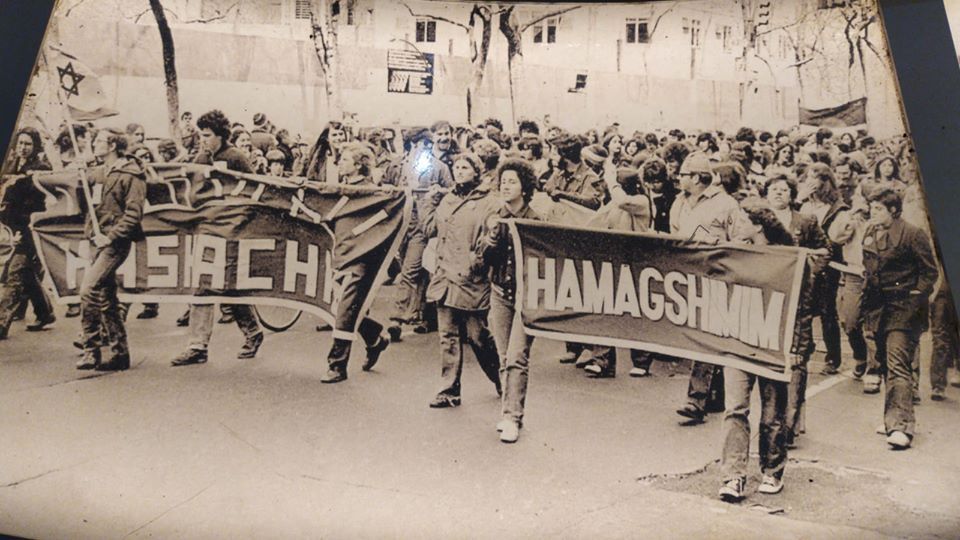
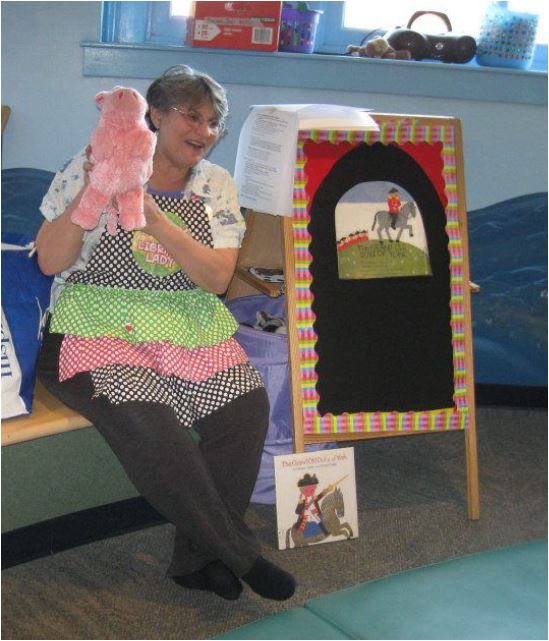 During a job interview at the Enoch Pratt Free Library in Baltimore, I asked if I could present Mother Goose on the Loose programs. The interviewer told me that recently published brain research showed that the architecture of the brain is built in the first few years of life, and that early experiences are important for influencing a child’s successful future. Not only could I do MGOL programs, but I was encouraged to start doing them as soon as possible. The need was great since programming for children under age three in the public library world at that time was rare and library directors were anxious to offer programs that parents wanted. Most librarians did not know what to do when directors told them to start programming for infants and toddlers; library literature on programming for babies was scant, and Google was not fully developed so searching online was not an obvious option.
During a job interview at the Enoch Pratt Free Library in Baltimore, I asked if I could present Mother Goose on the Loose programs. The interviewer told me that recently published brain research showed that the architecture of the brain is built in the first few years of life, and that early experiences are important for influencing a child’s successful future. Not only could I do MGOL programs, but I was encouraged to start doing them as soon as possible. The need was great since programming for children under age three in the public library world at that time was rare and library directors were anxious to offer programs that parents wanted. Most librarians did not know what to do when directors told them to start programming for infants and toddlers; library literature on programming for babies was scant, and Google was not fully developed so searching online was not an obvious option.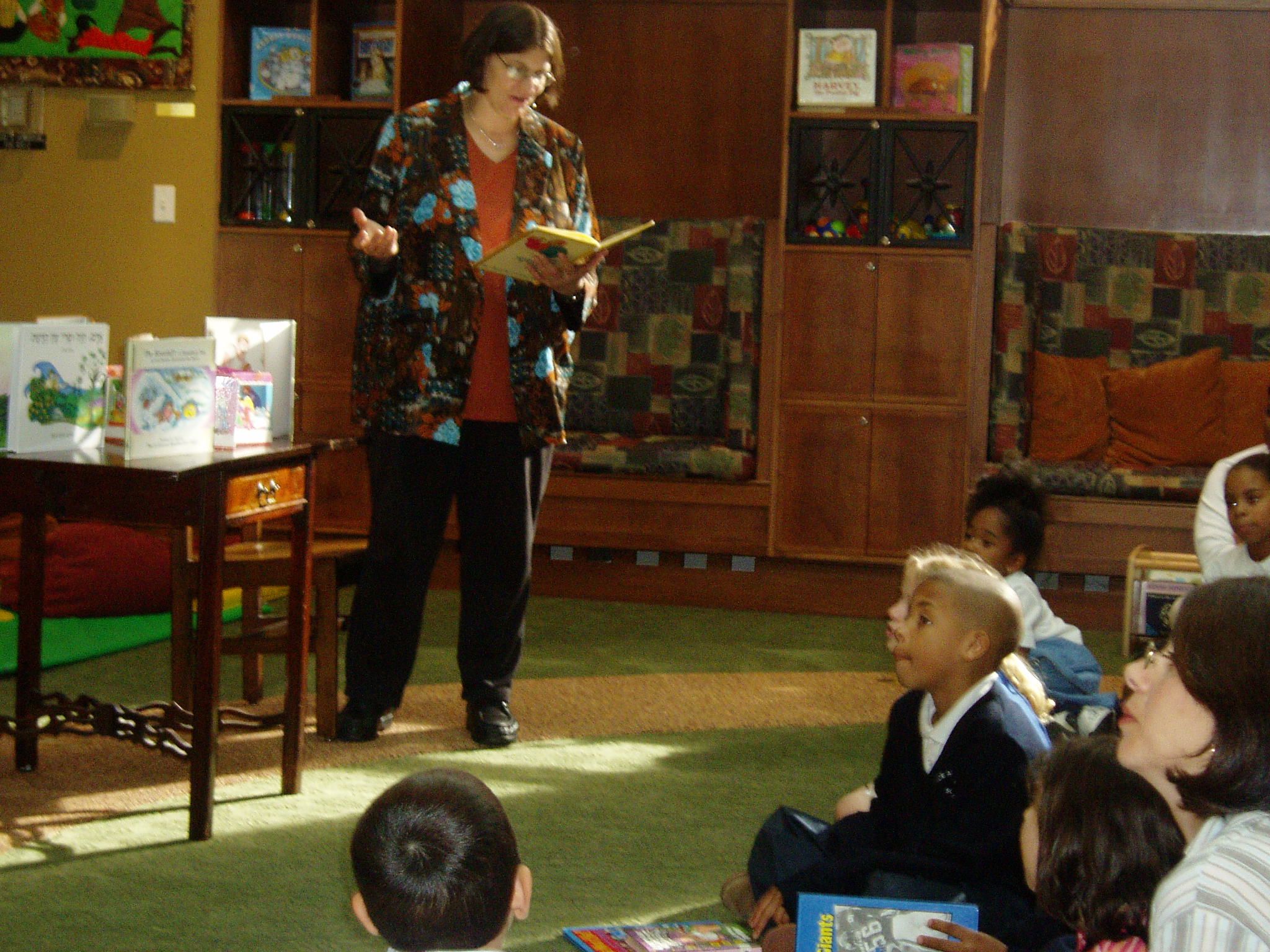



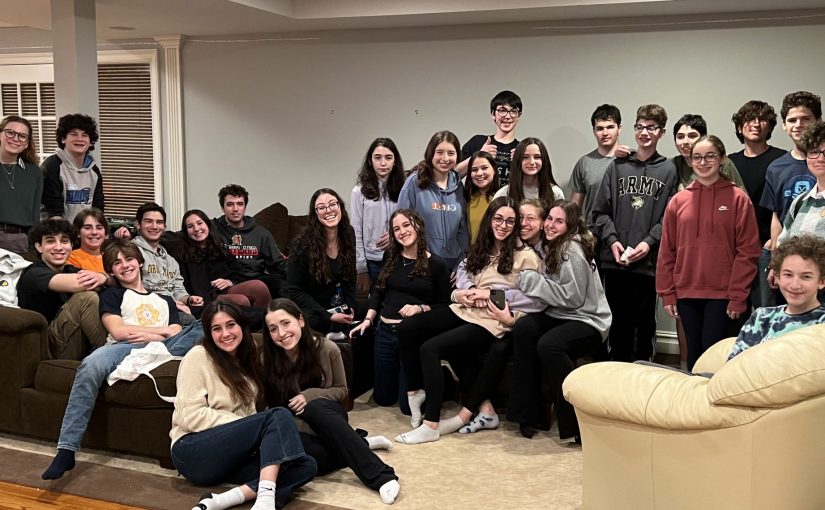
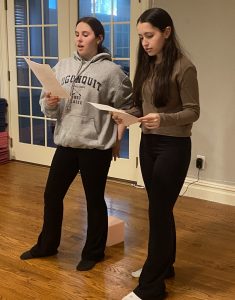 On February 27th, I, along with 25 other young Judaeans attended an event called “Day of Service”. At the event we participated in programs relating to a variety of worldly issues such as mental health, gender inequality, antisemitism, and much more. I participated in the educational station that discussed the effect of fast fashion and the materials and work that goes into making the clothing that we wear. It made me think about the clothing I own and how I don’t always need to follow the trends. Along with that I went thrifting the day before the event and after participating in this program I am sure I will be doing it again.
On February 27th, I, along with 25 other young Judaeans attended an event called “Day of Service”. At the event we participated in programs relating to a variety of worldly issues such as mental health, gender inequality, antisemitism, and much more. I participated in the educational station that discussed the effect of fast fashion and the materials and work that goes into making the clothing that we wear. It made me think about the clothing I own and how I don’t always need to follow the trends. Along with that I went thrifting the day before the event and after participating in this program I am sure I will be doing it again. Overall, I had a great time at this event! It was also a plus that I got to see all of my friends and share this experience with them.
Overall, I had a great time at this event! It was also a plus that I got to see all of my friends and share this experience with them.